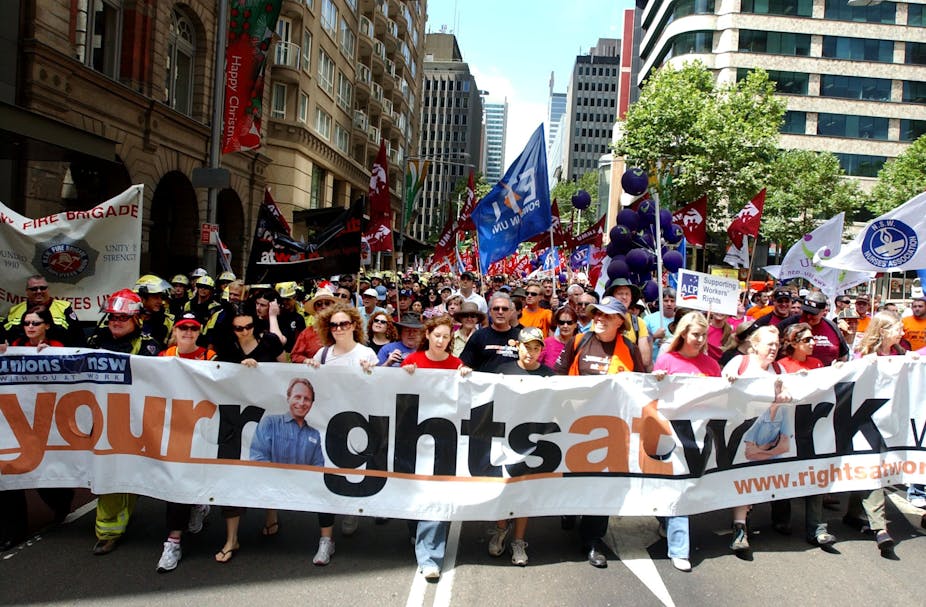With political debate dominated by carbon and mining taxes, the recent stirrings by Peter Reith about industrial relations may have come as a bit of a surprise – out of left field, if you will excuse the inverted irony of that phrase.
So what are we to make of Reith’s statements about the need to have another go at industrial relations regulation?
In case you missed it, had forgotten or were too young to have lived through it, Reith was the Minister for Industrial Relations in the Howard government in the late 1990s when the government colluded with a stevedoring company Patrick to lock out workers and bring in strike breakers trained in the Middle East.
No, let’s not dignify them or Reith – they were scabs, and Reith played a key role in the organisation of this shameful episode.
Indeed, the waterfront dispute was really the only significant thing that will be remembered about Reith’s political career, apart perhaps from his love of the media.
As Labor backbencher Arch Bevis has noted, “Peter Reith’s long political career is eminently forgettable except for one thing – his despicable role in the waterfront dispute.
"His signature will be the black balaclava and the attack dogs.”
That may be a bit unfair on Reith. There was, after all, the children overboard affair still to come, and the fact that it can be capitalised tells us it was an important moment in Australian history.
Reith retired shortly after these events, and most of us expected not to hear from this superannuated politician, except perhaps in announcements of lucrative government appointments and the odd statement in the media. And so it was, until a couple of months ago.
It seems that Reith is trying to carve out a space on the right of Tony Abbott on industrial relations. Abbott was a staunch supporter of the Liberal government’s WorkChoices legislation, but the electoral defeat of the Liberal government sent a shock wave through even the right of the party.
Many Liberal parliamentarians do not want another costly debate over industrial relations. In any case, the Rudd and Gillard governments have only knocked the worst edges off WorkChoices in their equally euphemistically titled FairWork Act.
Since becoming Opposition leader, Abbott has been very careful to avoid making industrial relations a front page story. Currently, IR is not exactly a bi-partisan policy, but it is still a bit of a no-go area for the Liberals.
This is where the re-entry of Reith comes in. The party is still licking its wounds over two electoral defeats in a row – the last agonisingly close.
Reith was part of the Liberal Party’s review of the last election campaign, and perhaps stirred on by this, has been presenting himself as a party reformer.
But Liberal Party members must surely be asking themselves what Peter Reith, an aging former Howard government IR warhorse, brings to reinvigorate and renew the party?
Interestingly, the current Liberal party national president, Alan Stockdale – a Victorian and a former Kennett government minister, who is now scion of the business community.
The previous national president, Tony Staley – about whom Alan Ramsey had some extremely unflattering things to say – is also a Victorian. So despite the battle within the party, administrative control remains a Victorian affair.
The only question Tony Abbott had to make was which Victorian he would back. At the last minute, and with a nervous flourish, he showed his casting vote to Alan Stockdale.
Reith seems to have the backing of several business leaders, including the always anti-union former mining boss Hugh Morgan, and the West Australia merchant banker, former Wesfarmers chairman and current chairman of National Australia Bank and Woodside Petroleum, Michael Chaney.
This line up is, as they say, probably no accident. Both these businessmen have interestes in the mining sector. With Rio Tinto acceding to again having a union presence on its sites after a long and protracted battle with the the CFMEU, and the AWU increasing its activity in alumina, perhaps this has raised the nightmares of their youth when mining unions were real threats to managerial prerogative.
But here is the rub – this thinking will only reinforce the tendency for the post-Howard Liberal Party to look backwards.
One of the achievements of the Rudd-Gillard Labor government, following the Howard one-bridge-too-far of WorkChoices, has been not just to get industrial relations off the front page, but to make industrial relations legislation increasingly irrelevant. More and more people, especially the young, are on casual contracts.
Many others are “self-employed”, and the old industrial awards have been stripped back to a shell. What electoral appeal will a campaign to take industrial relations even further into outright partisanship with employers possibly have, except with these ageing Liberal Party leaders and members?
How would such a political or electoral campaign speak to the 2013 equivalent of the Howard battlers? The Liberal Party proved incapable of renewal in government. The inability of the party to get Howard to resign was emblematic of that problem.
The current battle between Reith and Stockdale, and the emergence of this industrial relations rump suggests the party is still having problems with renewal out of office.

